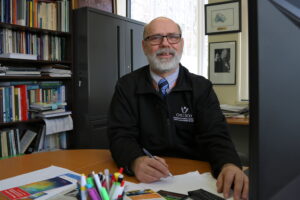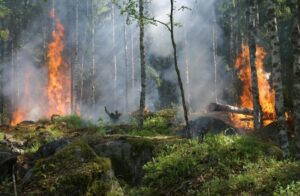
Recent speakers tour makes clear that, with its many proposed tar-sands-enabling pipeline projects, BC is the new front line in the global fight against climate change.
The Kinder Morgan Pipeline expansion project wants to
double the amount of tar sands crude piped from Edmonton to Burnaby, from 300,000 barrels a day to 750,000.
It’s a development which would explode tanker traffic in Burrard Inlet and double the risk posed to communities and the environment up and down the pipelines 1,150 kilometer path. But if the dialogue at a recent Council of Canadians anti-pipelines information session is any indication, the real dangers and risks of the expansion might not be so simple, or so local.
“Pipelines are the bloodlines of the tar sands, and if we don’t stop the pipelines we won’t stop the expansion of the tar sands.”
That was the central call to action from author and activist Maude Barlow at the recent “No Pipelines, No Tankers” campaign stop in Burnaby, which attracted over 300 concerned citizens to the gymnasium of Ecole Alpha Secondary School on a chilly Thursday night.
The tar sands role in the battle against climate change quickly became the theme of the evening, as all four speakers—Barlow, Sundance Chief Rueben George, lawyer Caleb Behn, and author-activist Bill McKibben—continually shifted the focus of the issue from one of local concern to global danger.
“You all are very lucky, here in Burnaby,” said McKibben, “to play a really outsized role in the greatest fight that human beings have ever had to take on, this fight against the biggest thing that we have ever done on this planet: change the composition of its atmosphere.”
The lofty tones were anchored with well known but no less sobering statistics and numbers on the loss of Arctic Sea ice, the rise of carbon emissions, and the acidification of the oceans.
Perhaps the most alarming statistic came from NASA climatologist James Hansen who, while not present, was referenced so often he was essentially the fifth speaker by proxy. McKibben raised
Hansen’s finding that if every ounce of economically recoverable oil from the Alberta tar sands was burned, the global carbon dioxide level would skyrocket to well over 500 parts per million (ppm). Currently the planet sits at 392 ppm, about 60 ppm above what’s considered safe.
But for all their inherent power, the numbers and stats offered were secondary, instead presented as reinforcement to a larger message, one which was repeated throughout the evening: That the danger of global warming is immediate, and that the time for resistance is now.
“It’s at the point where I regret going into a profession where I have to respect the law,” said young Dene nations leader and lawyer Caleb Behn.
“We have to build a movement,” declared Barlow, arguing that the various pipeline projects in BC need to be resisted in sum, rather than individually.
“All of us feel too small to do anything about global warming,” added McKibben, “that’s why it’s important to come together.”
There was, in the end, very little mention of specifics on the Kinder Morgan Pipeline expansion project. Surprising, perhaps, given that it’s a pipeline which ends at a station mere kilometers from where everyone was sitting. Instead, the dangers posed by each pipeline were folded into a bigger picture.
And the bigger picture prevailed.
Each speaker received standing ovations, and questions fielded from the audience afterward were about the global fight against climate change—by way of the tar sands by way of the pipelines—rather than within any framework of NIMBY-ism, or based on strictly localized fears.
The enemy presented, and accepted, was clear: the “rogue” (according to McKibben) fossil fuel industry, and the governments, which support and enable their continual growth. Both, according to the speakers on this night, are putting local communities at risk while en route to a larger destruction of the entire global ecosystem.
 Recent speakers tour makes clear that, with its many proposed tar-sands-enabling pipeline projects, BC is the new front line in the global fight against climate change.
The Kinder Morgan Pipeline expansion project wants to double the amount of tar sands crude piped from Edmonton to Burnaby, from 300,000 barrels a day to 750,000.
It’s a development which would explode tanker traffic in Burrard Inlet and double the risk posed to communities and the environment up and down the pipelines 1,150 kilometer path. But if the dialogue at a recent Council of Canadians anti-pipelines information session is any indication, the real dangers and risks of the expansion might not be so simple, or so local.
“Pipelines are the bloodlines of the tar sands, and if we don’t stop the pipelines we won’t stop the expansion of the tar sands.”
That was the central call to action from author and activist Maude Barlow at the recent “No Pipelines, No Tankers” campaign stop in Burnaby, which attracted over 300 concerned citizens to the gymnasium of Ecole Alpha Secondary School on a chilly Thursday night.
The tar sands role in the battle against climate change quickly became the theme of the evening, as all four speakers—Barlow, Sundance Chief Rueben George, lawyer Caleb Behn, and author-activist Bill McKibben—continually shifted the focus of the issue from one of local concern to global danger.
“You all are very lucky, here in Burnaby,” said McKibben, “to play a really outsized role in the greatest fight that human beings have ever had to take on, this fight against the biggest thing that we have ever done on this planet: change the composition of its atmosphere.”
The lofty tones were anchored with well known but no less sobering statistics and numbers on the loss of Arctic Sea ice, the rise of carbon emissions, and the acidification of the oceans.
Perhaps the most alarming statistic came from NASA climatologist James Hansen who, while not present, was referenced so often he was essentially the fifth speaker by proxy. McKibben raised Hansen’s finding that if every ounce of economically recoverable oil from the Alberta tar sands was burned, the global carbon dioxide level would skyrocket to well over 500 parts per million (ppm). Currently the planet sits at 392 ppm, about 60 ppm above what’s considered safe.
But for all their inherent power, the numbers and stats offered were secondary, instead presented as reinforcement to a larger message, one which was repeated throughout the evening: That the danger of global warming is immediate, and that the time for resistance is now.
“It’s at the point where I regret going into a profession where I have to respect the law,” said young Dene nations leader and lawyer Caleb Behn.
“We have to build a movement,” declared Barlow, arguing that the various pipeline projects in BC need to be resisted in sum, rather than individually.
“All of us feel too small to do anything about global warming,” added McKibben, “that’s why it’s important to come together.”
There was, in the end, very little mention of specifics on the Kinder Morgan Pipeline expansion project. Surprising, perhaps, given that it’s a pipeline which ends at a station mere kilometers from where everyone was sitting. Instead, the dangers posed by each pipeline were folded into a bigger picture.
And the bigger picture prevailed.
Each speaker received standing ovations, and questions fielded from the audience afterward were about the global fight against climate change—by way of the tar sands by way of the pipelines—rather than within any framework of NIMBY-ism, or based on strictly localized fears.
The enemy presented, and accepted, was clear: the “rogue” (according to McKibben) fossil fuel industry, and the governments, which support and enable their continual growth. Both, according to the speakers on this night, are putting local communities at risk while en route to a larger destruction of the entire global ecosystem.
Recent speakers tour makes clear that, with its many proposed tar-sands-enabling pipeline projects, BC is the new front line in the global fight against climate change.
The Kinder Morgan Pipeline expansion project wants to double the amount of tar sands crude piped from Edmonton to Burnaby, from 300,000 barrels a day to 750,000.
It’s a development which would explode tanker traffic in Burrard Inlet and double the risk posed to communities and the environment up and down the pipelines 1,150 kilometer path. But if the dialogue at a recent Council of Canadians anti-pipelines information session is any indication, the real dangers and risks of the expansion might not be so simple, or so local.
“Pipelines are the bloodlines of the tar sands, and if we don’t stop the pipelines we won’t stop the expansion of the tar sands.”
That was the central call to action from author and activist Maude Barlow at the recent “No Pipelines, No Tankers” campaign stop in Burnaby, which attracted over 300 concerned citizens to the gymnasium of Ecole Alpha Secondary School on a chilly Thursday night.
The tar sands role in the battle against climate change quickly became the theme of the evening, as all four speakers—Barlow, Sundance Chief Rueben George, lawyer Caleb Behn, and author-activist Bill McKibben—continually shifted the focus of the issue from one of local concern to global danger.
“You all are very lucky, here in Burnaby,” said McKibben, “to play a really outsized role in the greatest fight that human beings have ever had to take on, this fight against the biggest thing that we have ever done on this planet: change the composition of its atmosphere.”
The lofty tones were anchored with well known but no less sobering statistics and numbers on the loss of Arctic Sea ice, the rise of carbon emissions, and the acidification of the oceans.
Perhaps the most alarming statistic came from NASA climatologist James Hansen who, while not present, was referenced so often he was essentially the fifth speaker by proxy. McKibben raised Hansen’s finding that if every ounce of economically recoverable oil from the Alberta tar sands was burned, the global carbon dioxide level would skyrocket to well over 500 parts per million (ppm). Currently the planet sits at 392 ppm, about 60 ppm above what’s considered safe.
But for all their inherent power, the numbers and stats offered were secondary, instead presented as reinforcement to a larger message, one which was repeated throughout the evening: That the danger of global warming is immediate, and that the time for resistance is now.
“It’s at the point where I regret going into a profession where I have to respect the law,” said young Dene nations leader and lawyer Caleb Behn.
“We have to build a movement,” declared Barlow, arguing that the various pipeline projects in BC need to be resisted in sum, rather than individually.
“All of us feel too small to do anything about global warming,” added McKibben, “that’s why it’s important to come together.”
There was, in the end, very little mention of specifics on the Kinder Morgan Pipeline expansion project. Surprising, perhaps, given that it’s a pipeline which ends at a station mere kilometers from where everyone was sitting. Instead, the dangers posed by each pipeline were folded into a bigger picture.
And the bigger picture prevailed.
Each speaker received standing ovations, and questions fielded from the audience afterward were about the global fight against climate change—by way of the tar sands by way of the pipelines—rather than within any framework of NIMBY-ism, or based on strictly localized fears.
The enemy presented, and accepted, was clear: the “rogue” (according to McKibben) fossil fuel industry, and the governments, which support and enable their continual growth. Both, according to the speakers on this night, are putting local communities at risk while en route to a larger destruction of the entire global ecosystem.









